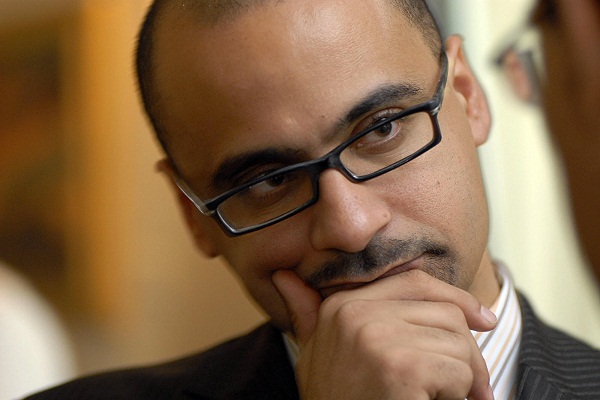Every so often a writer renovates a whole literary landscape from underneath. Armed to the teeth with slang and learning, Saul Bellow reinvented American prose with The Adventures of Augie March in 1953, and it took thirty years for a Martin Amis, a disciple of Bellow, to bring English up to date with Money. But then the language became saturated with people who wanted to sound like Amis and we needed writers from the Commonwealth to infuse English with their idioms to make it new again. (Or was this the other way around?)
New prose Messiahs are often announced but rarely stick around. Junot Diaz might well be the real thing for American prose: his has been celebrated for being lithe and alive since his first book, Drown, but more so since the Pulitzer-winning The Brief Wondrous Life of Oscar Wao. His Dominican characters usually speak a cocky dazzle of literary allusion and Spanish inflected street talk: foulmouthed, bookish and macho. Take this from his new collection of short stories: This Is How You Lose Her, in which the narrator, Yunior, describes his brother Rafa:
‘Not a week out of hospital, he cracked this illegal Peruvian kid in the face with a hammer and two hours later threw down at the Pathmark because he thought some fool was talking shit about him, popped said fool in the piehole with a weak overhand right before a bunch of us could break it up. What the fuck, he kept yelling, as if we were doing the craziest thing ever. The bruises he gave himself fighting us were purple buzz saws, infant hurricanes.’
The prose seems to bluster but is rich with detail and literary sensitivity. The throwaway phrase ‘this illegal Peruvian kid,’ which tells us the boy doesn’t have a visa, somehow makes that dangerous word ‘illegal’ a vulnerable one. Yet the victim of this senseless violence, in a darkly pathetic about turn, is the assailant. Even the bruises he gives himself are frustrated and futile: ‘infant hurricanes.’ Rafa, we learn, is dying of cancer.
This Is How You Lose Her, Diaz told The Guardian, is a ‘cheater’s progress, where this guy eventually discovers for the first time the beginning of an ethical imagination.’ Excepting one of its stories, it is a broken-up memoir of Yunior – who narrated some of Drown and all of Oscar Wao – exploring a lifetime of infidelity in a culture of infidelity. The stereotype – that women should be wary of Dominican men – is asserted as a premise. Yunior believes cheating is in his genes. His father cheated and so did his brother. The book becomes a chronicle of Yunior’s attempts to transcend this part of himself while demonstrating glimpses of real love which haven’t been enough to keep him from straying. Meanwhile, we are told of his arrival in the States as a child and his brother’s premature terminal illness. Lovers share beds while roommates or siblings pretend not to hear. Women, looking to support themselves and their families, are driven to different types of trickery: shotgun weddings, absconding on loans and paternity fraud.
Yunior is a sophisticated mouthpiece for Diaz’s intention. His way of putting things rarely courts our understanding or forgiveness. Most of the stories are apologies to women which are unrepentantly misogynistic in delivery (‘my brother never kept a girl, ever; dude had thrown away better bitches than Pura on the regular.) But what makes Yunior especially unforgivable is that unlike his father, brother, or his ‘boys’, he’s not only literate, but academic. By the final story he is either teaching at Harvard or another prestigious Massachusetts university, possibly MIT, where Diaz himself teaches. Yunior’s blind spot and biggest tragedy is that literature hasn’t improved him morally.
Yet it is a mark of Diaz’s skill that he is able to exploit this blind spot to create a plangent and frequently tender book. Like in Saul Bellow, emotional intelligence is conveyed, instinctually, through metaphors which lie half outside the reach of the character using them: the knowledge of Rafa’s illness is ‘a long dark patch of life like a mile of black ice waiting for me up ahead.’ In ‘Otravida, Otravez,’ the only story not narrated by Yunior, Yasmin, a young Dominican woman, kisses her lover’s knuckles which are ‘crinkled as prunes.’ (Bellow was always good at affectionately evoking the corrugations of living and aging.) Bloodstains and other marks on hotel sheets are ‘the alphabet of the sick and dying.’ Half the pleasure of reading this book is the sense you get that the characters don’t quite understand how aptly they capture what they are talking about.
This Is How You Lose Her cannot sincerely be called a book of short stories, though it displays the aspects of one. Endings are immaculately underlined in a way that owes something to Denis Johnson’s iconic collection Jesus’ Son, which Diaz acknowledges as an influence. ‘Alma,’ the shortest story, ends as Yunior’s girlfriend discovers his infidelity in a journal: ‘Baby, you say, baby, this is part of my novel. This is how you lose her.’ ‘Nilda,’ which describes Yunior’s youthful infatuation with his brother’s girlfriend, ends: ‘We never spoke again. A couple of years later I went away to college. I don’t know where the fuck she went.’ But these things aside, you would undoubtedly read the collection for its continuous narrative. ‘Otravida, Otravez,’ which falls outside the Yunior arc, is arguably the most formally perfect story, but only because it is more dutiful. While the voice is more chastened it has the highest concentration of beautifully realised images, even in the context of Diaz’s consistent virtuoso performance. Maybe there is something about Yunior’s rebellious style, bulging with backchat and puerility, which works better in looser forms, or demands a whole book for its canvas. It may even preclude the creation of a traditional short story. If this is so, you can get one of those elsewhere. You won’t get Diaz anywhere else.






Comments